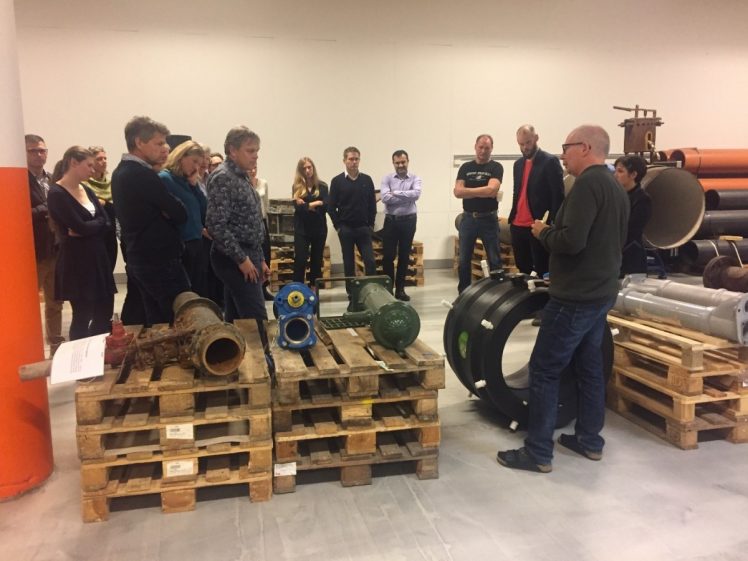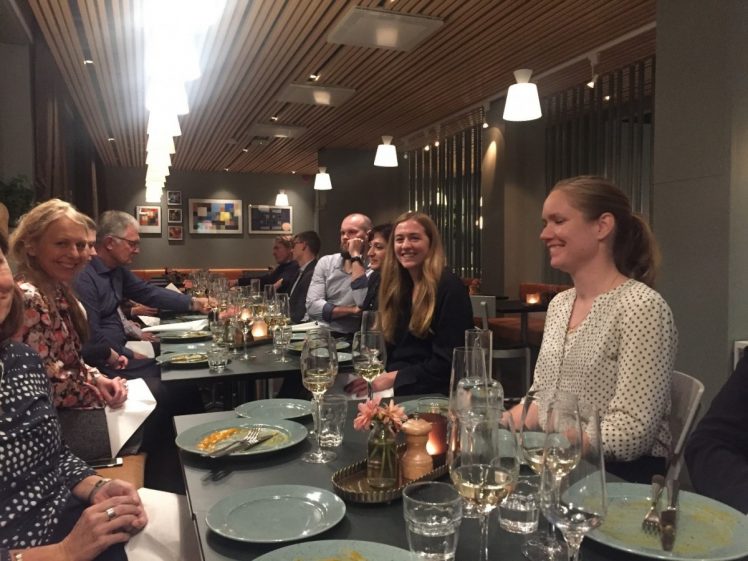At the end of September, it was time for Mistra InfraMaint’s first workshop for doctoral students involved in the research programme. InfraMaint, a research programme that started about a year ago, focuses on “smart” maintenance of infrastructure. The vision of the programme is a “sustainable infrastructure that is safe and available around the clock”. Critical infrastructure, like roads and water systems, are important for the daily functioning of the society. To guarantee their future services, knowledgeable and informed decisions need to be done to properly manage and maintain these systems. The implementation of smart technologies, such as sensors, AI, and IoT, has the potential of improving and making maintenance more sustainable and efficient. InfraMaint aims to halve the competence shortage and give municipalities and W&S operations a better basis for maintenance decisions.
The workshop took place at Stockholm Vatten och Avfall, Sweden’s largest water and waste management company and one of the partners in the research programme. InfraMaint consists of around 20 research projects, whereof ten of these are doctoral student projects. The projects cover different topics relevant for smart maintenance of infrastructure and are categorized according to three different themes; 1) sustainable decision support, 2) sustainable business model organization, and 3) sustainable competence building. Participating in the workshop were doctoral students, supervisors and the programme management. The aim of the workshop was to get to know each other and set out the common goals and vision of the programme.

The day started with an introduction to the research programme and its overall goals. Thereafter, the participants and the different research projects were presented. Most projects are now ongoing, however, a few are still waiting for a doctoral student to be appointed (if you, or someone you know, are interested in a PhD position, please check available positions at InfraMaint’s website). The day also included a guided tour at Stockholm Vatten och Avfall’s premises, as well as a presentation of how the implementation of a digital system has made part of their operation more efficient. During the day, discussions were held on how to emphasize collaboration between the different projects and how to work with knowledge sharing. The day ended with a joint dinner to conclude the day.

The following day, October 1st, InfraMaint’s yearly meet-up took place at RISE’s premises at KTH campus. The meet-up was opened to partners involved in the research programme, as well as other stakeholders interested in the programme. InfraMaint engages of a large consortium, involving universities, research institutes, and municipalities, among others. The day started with a general presentation of the programme and the current status of the different research projects. Progress and results from the programme this far were also presented. For instance, a pre-study to project 2.1 “Systems logic and business model alignment in smart maintenance of infrastructure” was done during the spring by the master’s students Emil Mårtensson and Philip Rumman at KTH. They conducted a case study at Stockholm Vatten och Avfall and their thesis “Asset management in the utility sector” presents possible challenges public utility companies face when implementing asset management principles.
During the second half of the day, digitalization was on the agenda and questions as “how do we implement digital systems?” and “how do we use available data?” were addressed. Representing the district heating industry, Magnus Ohlsson from Öresundskraft presented how they have digitalized their operation and now collect information about their systems to improve decision support. Lina Bertling Tjernberg, professor in Power Grid Technology at KTH, presented how the power grid uses databased maintenance-optimization. She emphasized that digitalization is a way to increase the value of assets, not only a way to “save money”. Lastly, Kristina Gabrielii, chairman of the board of Mistra InfraMaint, gave some inputs from the construction business. A common theme during the presentations was the importance of working with standardization.
The workshop for doctoral students and the yearly programme meet-up were two days filled with information and inspiration. The research projects within InfraMaint cover different aspects of maintenance of infrastructure, but with the common goal of a safe and available infrastructure. The days consisted of many interesting discussions and raised several relevant questions, illustrating a great interest and need for knowledge in the area. The days were a great chance to get to know other people working with smart maintenance and a possibility to share knowledge and ideas with each other. As one of the doctoral students in the research programme, I’m looking forward to continuing this project and taking part of the achievements we will accomplish together in the programme!
/Amelie Bennich
Doctoral Student at KTH, project 2.1 “Systems logic and business model alignment in smart maintenance of infrastructure” in Mistra InfraMaint

